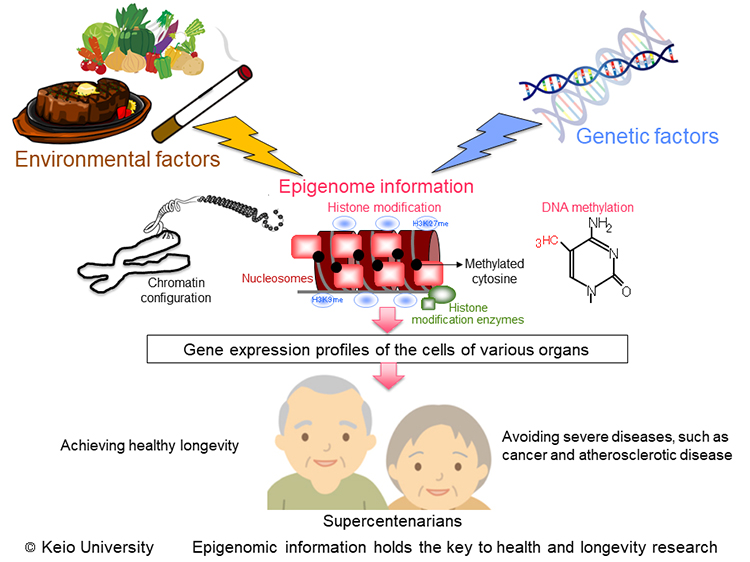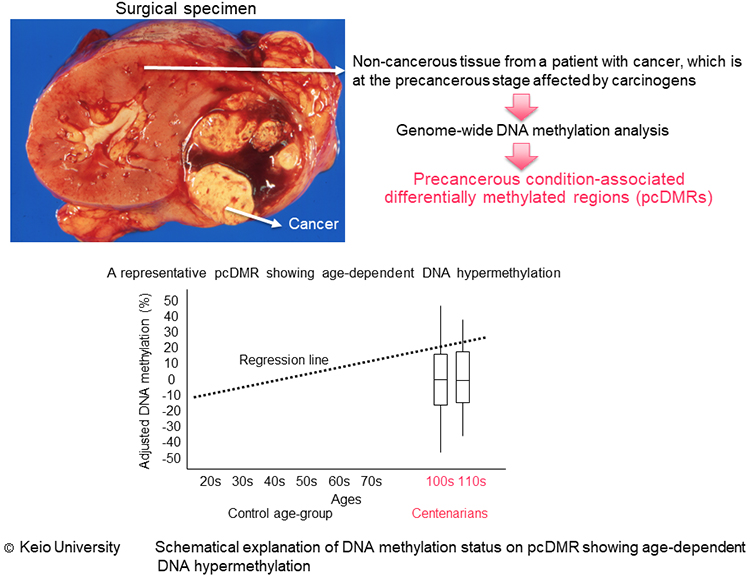Research outcomes of the Program for the Advancement of Next Generation Research Projects
School of Medicine
Yae Kanai

The desire for healthy longevity has been common to mankind since ancient times. In Japan, where the population is aging rapidly, it would be of great value to clarify the factors that determine healthy longevity so that individuals can enjoy a longer life free from disease. Healthy longevity is thought to be determined by both environmental (external) factors including lifestyle, and genetic (internal) factors. Susceptibility to diseases, such as cancer and atherosclerotic disease, is also a factor, and this can be determined directly by the gene expression profiles of cells from which diseases originate.
Epigenomic information is a type of tag attached to the four-letter TCGA code of DNA. This information determines chromosome structure and regulates gene expression. Yae Kanai, a professor at the Keio University School of Medicine's Department of Pathology, has previously published studies showing that environmental factors, including carcinogenic factors, can alter epigenomic profiles even from the precancerous stage, and that genetic polymorphisms can also induce individual differences in epigenomic profiles. Thus, epigenomic information can regulate the gene expression profiles of cells in various organs, which can potentially become the origin of diseases, and is highly influenced by environmental factors as well as genetic predisposition. As humans age, they are exposed to environmental factors for a longer time, so that the contribution of epigenomic information to phenotype eventually exceeds that of genomic information. This makes epigenomic information central to health and longevity research. Among the types of epigenomic information, DNA methylation profiles, which are less plastic than histone modifications, may define resistance to disease and determine longevity, because once altered, they are stably conserved in the genome by a maintenance methylation mechanism involving DNA methyltransferase. A new study by Kanai and her research team focused on genome-wide DNA methylation profiles to clarify the mechanisms involved in disease avoidance and achievement of healthy longevity.
Individuals who live to 110 years of age or older are referred to as "supercentenarians." For Kanai's study, blood samples were collected from individuals aged between 101 and 115 years - including supercentenarians participating in the Tokyo Centenarians Study and the Japan Study of Supercentenarians conducted by Professor Yasumichi Arai and his group at the Keio University School of Medicine's Center for Supercentenarian Medical Research. As controls, blood samples from individuals aged 20 to 79 years who participated in the cohort study conducted by the Tohoku Medical Megabank (TMM) Project were used. Under the auspices of the Program for the Promotion of Next Generation Research Projects, the epigenomic status of these samples were analyzed in cooperation with Professor Atsushi Shimizu and his group at Iwate Medical University.
Among the many CpG sites in the human genome, some show changes in epigenomic state with aging. The research group developed a computational model (an "epigenetic clock") using epigenomic information from the TMM project participants which could estimate the calendar age of Japanese individuals with a high degree of accuracy. This epigenomic clock was then used to calculate the epigenomic age of centenarians and the results were compared with their actual age. This revealed that almost all centenarians had an epigenomic age younger than their calendar age, suggesting that marked longevity beyond 100 years is associated with a characteristic DNA methylation state.
In the control participants, the team subsequently detected 408 CpG sites that were hypermethylated and 1,701 CpG sites that were hypomethylated along with age. Among these CpG sites, some were found that were maintained at the same level of DNA methylation in both centenarians and younger individuals, as well as CpG sites showing accelerated changes in DNA methylation. Many of the CpG sites that were maintained in a "young" state in centenarians were found to be clustered in the vicinity of oncogenic and tumor-suppressive pathways, while many of the CpG sites showing accelerated epigenomic changes were clustered in the vicinity of TGF-β signaling. Since various age-related diseases are thought to involve chronic inflammation, TGF-β, which has anti-inflammatory effects, may play an important role in successful aging. These results were published in Lancet Healthy Longevity.
Furthermore, by analyzing a large number of human pathological tissue specimens of various organs, Kanai's team were able to define a genomic region - the precancerous condition-associated differentially methylated region (pcDMR) - in which DNA methylation abnormalities are commonly observed even from the precancerous stage. In pcDMRs, which show age-dependent changes in DNA methylation levels, the DNA methylation levels of centenarians were maintained at the same levels as those of young people. This suggests that for achievement of healthy longevity, maintenance of a carcinogenesis-suppressive DNA methylation profile is necessary. In addition, the results of network analysis focusing on protein function indicated that the CpG sites maintained at a younger state in centenarians were located in genes related to cognitive function.

Kanai's research group, in collaboration with a commercial company, has developed a DNA methylation diagnostic system based on high-performance liquid chromatography. This system is easy to operate, has excellent quantitative performance, and can be easily introduced into hospital laboratories. It is also suitable for analysis of clinical specimens containing a mixture of different cell lineages. In the future, non-invasive DNA methylation diagnosis using blood samples is expected to predict the likelihood of healthy longevity and help avoid cancer and cognitive impairment, thus allowing the development of interventional and preventive strategies.
Reference
- Komaki S, Nagata M, Arai E, Otomo R, Ono K, Abe Y, Ohmomo H, Umekage S, Shinozaki NO, Hachiya T, Sutoh Y, Otsuka-Yamasaki Y, Arai Y, Hirose N, Yoneyama A, Okano H, Sasaki M, Kanai Y, Shimizu A. Epigenetic profile of Japanese supercentenarians: a cross-sectional study. Lancet Healthy Longevity. 2023;4:e83-e90. doi: 10.1016/S2666-7568(23)00002-8.
Related information
Keio University Program for the Advancement of Next Generation Research Projects
The Keio University Program for the Advancement of Next Generation Research Projects subsidizes research costs with the aim of finding solutions to challenges and of promoting global academic research in order to allow Keio University faculty members to establish a presence as core researchers.